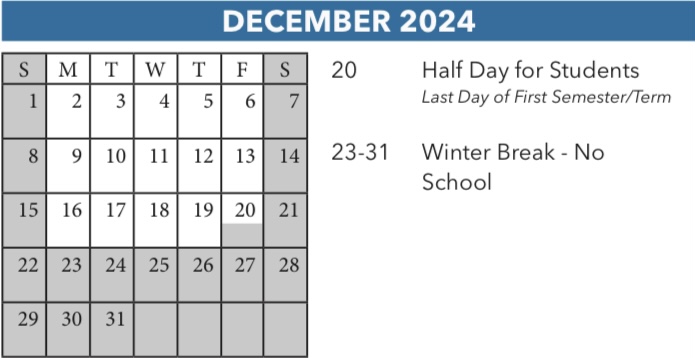For students and teachers alike, the holiday season is a much-needed chance to unwind from a stressful semester by spending more time with family, indulging in holiday traditions and recharging for the new year. However, this year, many have noticed the winter break is shorter than in previous years, as it begins as a half-day on Dec. 20 and only continues until Jan. 6. A less-than-three-week break can be disappointing for some but beneficial for others.
Shorter breaks are believed to be more beneficial for learning retention and academic focus. According to Indegene (2021), it is statistically proven that the human brain, without practice, can only retain 10% of information learned the previous week. A shorter break could ensure information gained over the past semester is maintained. Another plus about a shorter break is that it can benefit students who struggle with time management and may feel disconnected from school with the extended break. A shorter break would lead to an easier transition into the new semester. It would provide a more comfortable and stress-free environment for students without the prolonged break, feeding students anxiety about school.
The advantages of the longer break could be handy for studying without the pressure of school the next day. During an extended break, students have more time to refine projects and review term papers or various essays. Students can continue their academics, which benefits those who prefer to learn at their own pace. In addition to having more time for schoolwork, students who have part-time jobs, extracurriculars or other responsibilities outside of school will have more time to organize their schedules.
The pressure of school is a significant reason students prefer a more extended winter break. After finals and getting grades in order, anyone would choose a few extra weeks to recover mentally and physically. A few weeks without homework or tests can allow students to enjoy more time with family and friends, especially during the holiday season. Without the longer stress-free time, students may feel burnt out and return to school without proper relaxation, impacting performance, mental health and more.
The length of winter break is a fine line between balancing mental health, relaxation and time management. On one hand, a shorter winter break will provide an easier transition into the new year while remaining academically rigorous. In contrast, a longer winter break provides time for students to relax after a stressful year and gives more time for students with outside responsibilities to get more work done. Ultimately, the preference for a longer or shorter winter break rests entirely on individual preferences and learning abilities.








